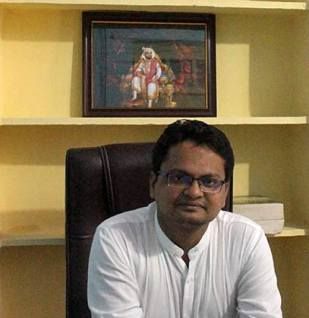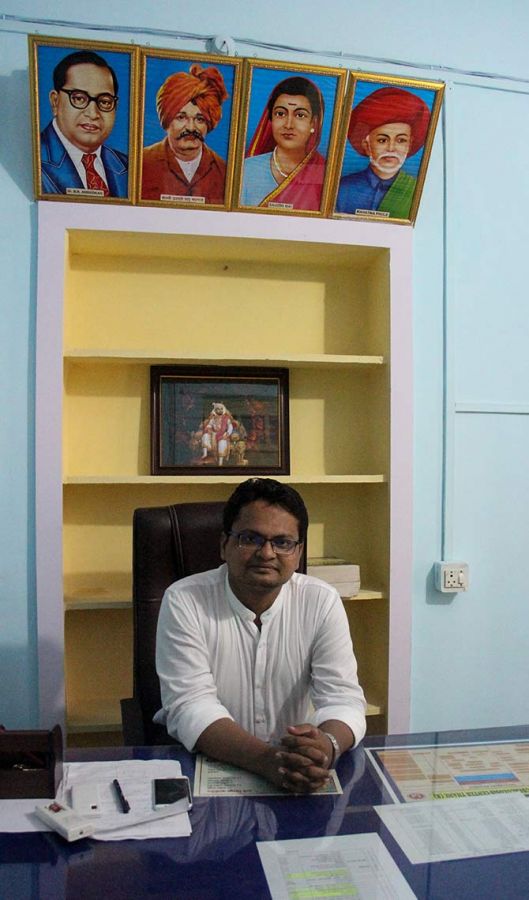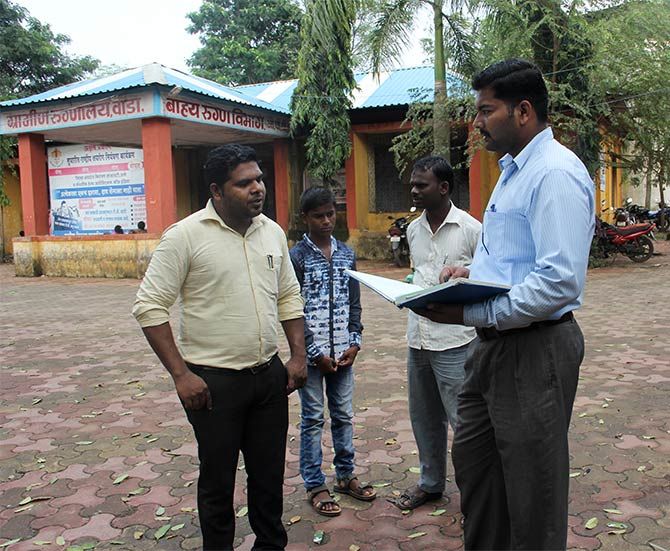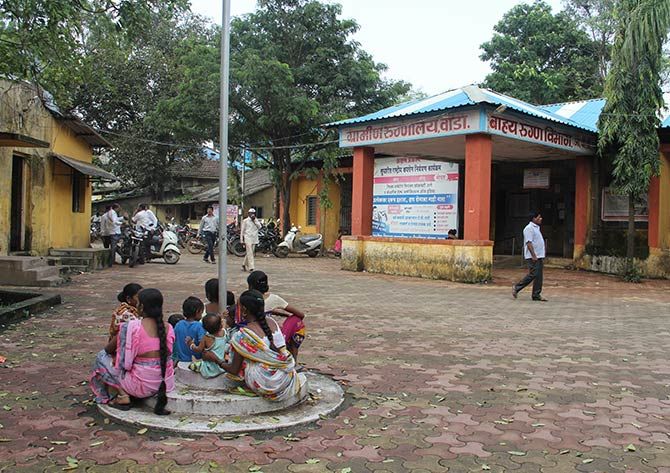
- The Malnourished Corridor: Part 1: 'Our children have only hunger written in their destiny'
- Part 2: The battle against hunger is long and tough
Just two doctors attend to almost 300 patients at a hospital in Maharashtra's Malnourished Corridor every day.
Reportage: Prasanna D Zore/Rediff.com and Uttam Ghosh/Rediff.com
Photographs: Uttam Ghosh/Rediff.com

A few minutes after speaking with Rediff.com, Dr Jadhav got busy, checking the boy in the picture below.
After listening to the boy's relative about his case history and seeing his diagnosis papers, Dr Jadhav asked the boy to lift his left leg and stand on his right, all the while holding him firmly.
The boy would often lose his balance after lifting his left leg.
A steady stream of patients pours into the out-patient and in-patient departments at the rural hospital, Wada, a few hours away from Mumbai.
The patients who visit this hospital in Wada taluka in Palghar district, that is emerging as Maharashtra's Malnourished Corridor, know there are not enough doctors to look after those admitted to this 30-bed hospital.
The locals are used to the pace at which patients get treated at the hospital. They know the number of patients that come in far outnumber the doctors on duty on any given day here.
"The situation is the same even in Mokhada and Vikramgadh, the other two talukas that has government-run rural hospitals," says Ram Bhirad (name changed on request), waiting outside the ward where his daughter is being treated for Moderate Acute Malnutrition (MAM).
At any given time, says Bhirad, there are more patients than the hospital or its two doctors -- Dr Pradip Jadhav and Dr Samadhan Pagare -- can cater to.
"Fortunately, my daughter wasn't a Severe Acute Malnutrition (SAM) case -- many children under the age of 5 have been reported dead because of SAM -- and has gained good weight in the last seven days," he says.
According to Dr Pradip Jadhav, who has an MBBS degree from the respected Sion Hospital in Mumbai, one of the two Resident Medical Officers -- the other is Dr Pagare -- they see as many as 300 to 350 patients every day.
"Being in residence we are available 24x7," says Dr Jadhav whose living quarters are located barely 10 metres away from the hospital building. Dr Jadhav has been posted at Wada for the last two years.
The doctors treat colds, cough, loose motions, fevers to suturing and stitching of accident victims, conducting deliveries of pregnant mothers, even post mortems.
"In a month," Dr Pagare says, "each of us helps 60 to 70 mothers deliver babies as well as perform 8 to 10 post mortems."

The patient, a boy in the background, suffers from a disorder of the cerebellum that makes him lose his balance, as his father (in white shirt) listens intently.
Earlier, this boy had been diagnosed by Dr Pradip Jadhav.
On September 27, the 10-bed hospital was fully occupied with 7 patients suffering from SAM and 3 from MAM.
"We keep the malnourished children admitted for 14 days in our hospital," says Dr Pagare. "Depending upon weight gain recorded by these patients we discharge them after the first seven to 10 days."
"Those who come here with a serious medical condition are immediately reported to hospitals in Thane, Nashik or Mumbai," adds Dr Pagare, who voluntarily chose to serve in a rural area after completing his MBBS from Mumbai's respected Nair Hospital.
Rural hospitals like Wada's, Dr Jadhav says, act as important arms to implement schemes like the Rashtriya Bal Swasthya Karyakram under the National Rural Health Mission, a Government of India scheme, that aims early identification of children between the ages of 0 to 18 with birth defects, deficiencies and diseases, including malnutrition.
As per the medical practice and norms stipulated by the state government, a rural hospital must have at least 10 doctors on duty at such health centres. Dr Jadhav says the rural hospital, Wada, has 10 doctors on duty to cater to 350 patients on an average who visit the hospital every day.
A health worker at the facility tells us that only two doctors have been stationed at the hospital for the last two months.
Until Dr Pagare joined duty two months ago, according to this health worker, Dr Jadhav was a one man army at the hospital.
Dr Jadhav says three doctors are available on different days through the week under the central government's AAYUSH programme: One doctor each trained in unani, homeopathy and ayurvedic medicine.

Vedansh Mahesh Madhvi, a 4-year-and-8-month-old boy, was brought from Sonshiv village, Wada, in a critical condition on the morning of September 26 with severe breathlessness, Dr Jadhav says,
"He came to our hospital at 5.50 am. When we checked his blood, his haemoglobin level was showing a count of 4.1 (the normal blood haemoglobin level stands at 13), so we immediately asked his parents to take Vedansh to the Thane civil hospital because he needed blood transfusion immediately."
"By 6.10 am he was on his way to the Thane hospital. He was suffering from severe anaemia and not malnutrition, hence we asked the family to go in for a blood transfusion," says Dr Jadhav.
"Vedansh died on his way to the Thane hospital at 6.45 am," his father Mahesh Madhvi tells Rediff.com at his home in Sonshiv, a day after his son's death.
Ask Dr Jadhav how they handle the emotional trauma that comes with handling such tragedies and he says, "As doctors we have to be on our guard always. While handling emergencies we do not care about our emotions. Giving our best to the patient is our top-most priority at such times."
"We too are human," Dr Pagare adds. "It affects us sometimes when we think about these cases. But we do not have much time to philosophise about deaths because the next case is always round the corner. Our job is to give our 100 per cent to our patients."
"They (Dr Jadhav and Dr Pagare) are our real heroes," says Ram Bhirad. "So were the doctors who were here earlier and coped with the insurmountable pressure they must have felt doing their jobs."
After a 10-minute conversation with Rediff.com, Dr Jadhav terminates the interview. He has received an urgent phone call from an assistant. The expression on Dr Jadhav's face changes dramatically.
"It's an emergency. A woman is in labour. I have to take your leave," he says politely, as he heads towards the delivery room.






 © 2025
© 2025